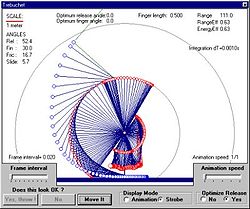That's a Trebuchet

It's been a while since I blogged about a simple drug smuggling scheme. Generally, I am happy to report, I work with commercial importers. Only rarely have I had to call in a criminal lawyer for help. Still, this is a border issue, and it counts as amusing, at least to me. Various news outlets are reporting that Mexican drug smugglers had been attempting to use a catapult to hurl marijuana across the border. Clearly, this is the work of a geek smuggler (and I mean that in a positive sense). But, looking at the poor video, it looks like the gizmo was actually a trebuchet, which is much more elegant than a simple catapult. A trebuchet is a "siege engine" used until the 13th Century to toss heavy, burning, or infected things at one's opposition. Apparently, a trebuchet is far more accurate than a catapult. The difference between the two being, at least as I understand it, that the trebuchet has a loose rope-link sling rather than a fixed basket for the projectile. Thi...